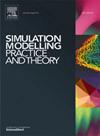Optimization of Veno parameter based on stochastic approximation: OVeno
IF 3.5
2区 计算机科学
Q2 COMPUTER SCIENCE, INTERDISCIPLINARY APPLICATIONS
引用次数: 0
Abstract
Transmission Control Protocol (TCP) ensures reliable communication between source and destination. However, TCP’s performance is significantly affected by congestion control, which regulates data flow and maintains optimal transfer rates while preventing packet loss. Congestion control is managed by the router that is network-assisted, and another approach is controlled by TCP, which is end-to-end congestion control. A popular TCP congestion control algorithm, Veno has the advantage of distinguishing between random loss and congestion loss. Veno serves as the base algorithm of TCP, performing well even in the presence of a wireless environment. These important features motivate us to redesign the Veno. This paper proposes a modified multiplicative decrease phase of the TCP Veno algorithm based on the stochastic approximation that is used to determine the optimal value of parameters. The performance evaluation of the proposed algorithm is evaluated with recent existing algorithms. The experimental result shows that the proposed approach improves the performance of the existing standard algorithms in terms of loss rate, throughput, and delay. Our proposed algorithm improves throughput by 143%, 131%, 66%, and 42% compared to Reno, Compound TCP, CUBIC, and Veno, respectively. We have also tested the efficacy of our proposed algorithm in the wireless environment.
基于随机逼近的Veno参数优化
TCP (Transmission Control Protocol)是传输控制协议,用于保证源端和目的端之间的可靠通信。但是,拥塞控制对TCP的性能有很大的影响,拥塞控制是在控制数据流的同时,保持最优的传输速率,防止丢包。拥塞控制由网络辅助的路由器管理,另一种方法由TCP控制,即端到端拥塞控制。Veno是一种流行的TCP拥塞控制算法,它具有区分随机损失和拥塞损失的优点。Veno作为TCP的基本算法,即使在存在无线环境的情况下也表现良好。这些重要的功能促使我们重新设计Veno。本文提出了一种改进的基于随机逼近的TCP Veno算法乘减相位,用于确定参数的最优值。用现有算法对所提算法的性能进行了评价。实验结果表明,该方法在丢包率、吞吐量和时延方面都优于现有的标准算法。与Reno、Compound TCP、CUBIC和Veno相比,我们提出的算法分别提高了143%、131%、66%和42%的吞吐量。我们还在无线环境中测试了所提出算法的有效性。
本文章由计算机程序翻译,如有差异,请以英文原文为准。
求助全文
约1分钟内获得全文
求助全文
来源期刊

Simulation Modelling Practice and Theory
工程技术-计算机:跨学科应用
CiteScore
9.80
自引率
4.80%
发文量
142
审稿时长
21 days
期刊介绍:
The journal Simulation Modelling Practice and Theory provides a forum for original, high-quality papers dealing with any aspect of systems simulation and modelling.
The journal aims at being a reference and a powerful tool to all those professionally active and/or interested in the methods and applications of simulation. Submitted papers will be peer reviewed and must significantly contribute to modelling and simulation in general or use modelling and simulation in application areas.
Paper submission is solicited on:
• theoretical aspects of modelling and simulation including formal modelling, model-checking, random number generators, sensitivity analysis, variance reduction techniques, experimental design, meta-modelling, methods and algorithms for validation and verification, selection and comparison procedures etc.;
• methodology and application of modelling and simulation in any area, including computer systems, networks, real-time and embedded systems, mobile and intelligent agents, manufacturing and transportation systems, management, engineering, biomedical engineering, economics, ecology and environment, education, transaction handling, etc.;
• simulation languages and environments including those, specific to distributed computing, grid computing, high performance computers or computer networks, etc.;
• distributed and real-time simulation, simulation interoperability;
• tools for high performance computing simulation, including dedicated architectures and parallel computing.
 求助内容:
求助内容: 应助结果提醒方式:
应助结果提醒方式:


